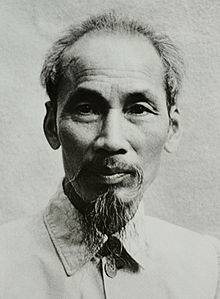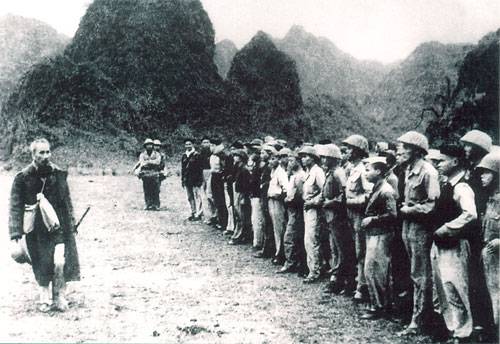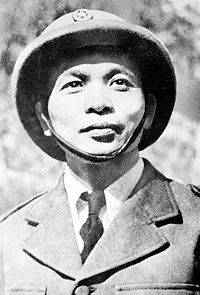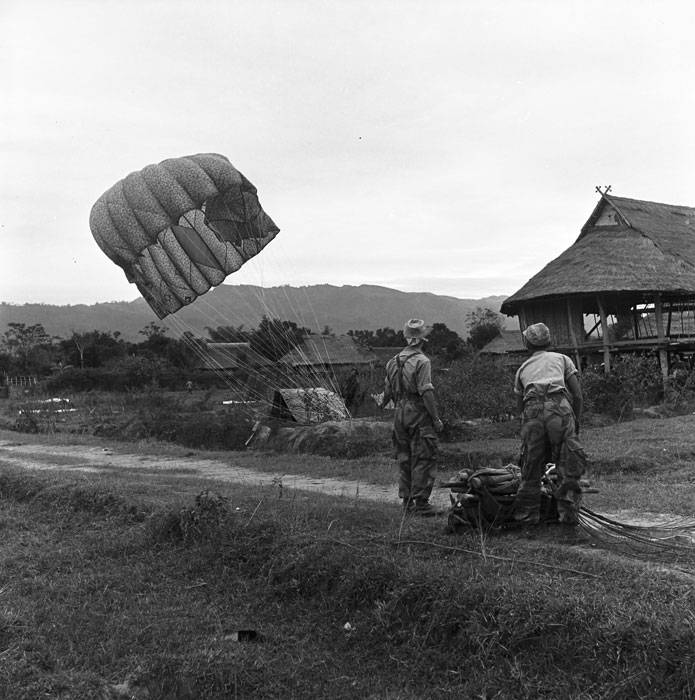How Vietnam defeated the French colonialists. Seventy years ago, the First Indochina War began.
The beginning of the First Indochina War was due to France’s reluctance to part with its Indochinese colonies. Vietnam, to a lesser extent - Cambodia and Laos, were very important for France. At stake was not only the prestige of one of the largest European colonial powers, but also the economic and military-political interests of France.
As you know, in the second half of the XIX century, France began to colonize East Indochina. Between 1858 and 1884 France conquered the territory of Vietnam, divided into a colony of Cochinchina and protectorate Annam and Tonkin. Also under the control of France were the protectorates of Cambodia and Laos. In 1887, the administrative formation “Indochinese Union” was created, which included the territories of modern Vietnam, Cambodia and Laos. At the head of the colony was put the Governor-General, representing the French president. In addition, the French colonial authorities left the imperial court in Vietnam and the royal courts in Cambodia and Laos, and also retained the privileges of numerous small feudal lords, who, according to the plans of the colonial administrators, were to assist the French authorities in managing and maintaining order in the colonies.
In the provinces of French Indochina, popular unrest against the colonial authorities flared up more than once, but they were harshly suppressed with the involvement of native and French troops. However, as early as the first quarter of the twentieth century, revolutionary ideas began to penetrate French Indochina, which found supporters among representatives of the local intelligentsia. In 1920's the first communist organizations appeared in Vietnam, proclaiming Marxism as their ideology. In 1930, the Communist Party of Indochina (CPC) was created by a group of revolutionaries in Hong Kong. In addition, there were numerous right-wing nationalist organizations in Vietnam that enjoyed greater influence than the Communists and met with support among traditional nobility, the bourgeoisie and the bureaucracy. In 1930's Pro-Japanese ideas began to spread among the Vietnamese right, which was associated with Japan's activization in Asian politics and the positioning of Tokyo as the main opponent of European colonial expansion in the Asia-Pacific region.
When World War II began and France was occupied by the Hitlerites, who established the Vichy collaborationist regime in the country, French Indochina fell into the sphere of influence of the Japanese Empire. In Tokyo, a decision was made to bring troops into Indochina. In September, Japanese forces under the command of Lieutenant General Akihito Nakamura invaded Vietnam 1940. Despite the attempts of the Vichy government to prevent the occupation of French Indochina, in fact, the colonial possessions of Paris in Southeast Asia were under the control of Tokyo. The Japanese leadership skillfully played on the nationalist feelings of the Vietnamese, planning to create in Vietnam a controlled puppet state like Manchukuo. In order to enlist the support of the Vietnamese population, the Japanese authorities in every possible way demonstrated their friendliness to the representatives of the Vietnamese political elite, including the emperor Bao Dai. Although the French colonial administration of the Vichy regime remained formally in French Indochina, in reality all the political issues of the colony were decided by the Japanese command.
When, in 1945, the Vichy regime fell under the blows of the Allied forces, the Japanese command decided to liquidate the Vichy administration in Vietnam, Cambodia and Laos. At the initiative of the Japanese leadership, preparations began for the proclamation of the independence of the former three French colonies in Indochina. 9 March 1945, the French management in Indochina was eliminated. After that, the Japanese command demanded that the emperor Bao Dayai declare the independence of Vietnam. Although the emperor had been loyal to the French before, the Japanese threatened to take over the throne and hand it over to the crown prince. After that, Bao Dai went to the declaration of independence of the country. 11 March 1945, he announced the treaty with France 1884, denounced. The independence of the Vietnamese empire was proclaimed. In June 1945, the Japanese authorities even went to reunify Cochin China (South Vietnam) with the rest of Vietnam. Solemn events dedicated to the reunification of Vietnam were scheduled for August 8 on the 1945 of the year.
 However, the August 1945 of the year was marked by the most severe defeats of the Japanese troops. 15 August 1945 The emperor of Japan addressed the people, announcing the surrender of the Japanese empire. For Vietnam, this event was a landmark. Taking advantage of the confusion that has arisen, the Vietnamese communists, who by this time had achieved significant success in the guerrilla war, advanced towards Hanoi. Ho Chi Minh (pictured) sought to launch an armed uprising against the imperial regime before British or American troops landed in Vietnam. 17 August 1945 The Vietminh forces captured Hanoi, and on August 19 a rally of many thousands was held in the central square of the city, where the victory of the revolution was announced. 25 August 1945. Emperor of Vietnam Bao Dai officially abdicated. 2 September 1945 announced the creation of the Democratic Republic of Vietnam. Thus, the first people's democratic state appeared in Southeast Asia.
However, the August 1945 of the year was marked by the most severe defeats of the Japanese troops. 15 August 1945 The emperor of Japan addressed the people, announcing the surrender of the Japanese empire. For Vietnam, this event was a landmark. Taking advantage of the confusion that has arisen, the Vietnamese communists, who by this time had achieved significant success in the guerrilla war, advanced towards Hanoi. Ho Chi Minh (pictured) sought to launch an armed uprising against the imperial regime before British or American troops landed in Vietnam. 17 August 1945 The Vietminh forces captured Hanoi, and on August 19 a rally of many thousands was held in the central square of the city, where the victory of the revolution was announced. 25 August 1945. Emperor of Vietnam Bao Dai officially abdicated. 2 September 1945 announced the creation of the Democratic Republic of Vietnam. Thus, the first people's democratic state appeared in Southeast Asia. Naturally, the proclamation of a sovereign state, even under the control of the communists, was not at all part of the plans of France, which, after Japan’s capitulation, was seeking to regain control of its Indochinese possessions. The colonialists decided to act from the south of the country, where the Communists did not have such strong positions. September 13 The British troops landed in Saigon on September 1945, and on September 20 they transferred power over South Vietnam to the French administration.
However, the French authorities had no choice but to recognize 6 March 1946, the independence of the Democratic Republic of Vietnam - but as part of the Indochinese Federation. Paris stubbornly did not want to part with their colonies. At the same time, the French authorities made every possible provocation against the young Vietnamese republic. Since at the end of March 1946, the British troops were finally withdrawn from the territory of Eastern Indochina, the French administration attempted to regain its authority over the former colony in full.

20 November 1946 was fired on a boat belonging to the DRV by the French side near the port of Haiphong. After that, France demanded the DRV to transfer back the port of Haiphong. The leadership of the Democratic Republic of Vietnam refused to satisfy this demand of the French side. After that, the French warships fired at the port of Haiphong. The fire was carried out, including in residential areas of the city, which led to large casualties among the civilian population. Several thousand people (from 2 thousand to 6 thousand according to various sources) died.
The attack on the port of Haiphong became one of the main immediate causes for the start of the First Indochinese War. By this time, the government of the Democratic Republic of Vietnam was already well aware that an armed confrontation with France could not be avoided. But the Vietnamese patriots were ready to fight against yesterday’s metropolis, even despite the latter’s considerable superiority in weapons and other resources.
19 December 1946, the French command demanded that the DRV leadership disarm the Vietnamese armed forces in Haiphong. On this demand, the French received a decisive refusal, after which hostilities began. On the same day, the French armed forces launched an attack on the Vietnamese capital, Hanoi. The fighting in the territory of Hanoi lasted two months - until February 1947. Using forceful superiority, the French were able to take control of the main cities of North Vietnam and block key roads. The communists retreated to the Vietbak region, where they started a guerrilla war and build up forces to retaliate.
Thus began the First Indochina War, which lasted eight years and ended in the complete defeat of France. In this war, the Democratic Republic of Vietnam was confronted not only by French expeditionary forces and colonial forces with a total of 190 thousand soldiers and officers and another 55 thousand people in auxiliary units, but also the Army of Vietnam, created in 1949 in the south of the country and controlled by the French. The number of South Vietnamese troops was about 150 thousands of troops, but their training and motivation were significantly lower than that of both the French and the DRV army. The leadership of the Vietnamese Peoples Army was carried out by Wo Nguyen Giap (in the photo) - one of the famous commanders of the Indochinese wars.

In October, French troops attempted to take control of Vietbach, 1947, however, faced serious resistance from the DRV forces and suffered significant losses. The retreat in Vietbach used the command of the DRV forces to strengthen its army and raise the level of its training. In the fall of 1949, the Viet Minh’s armed forces for the first time in three years after the outbreak of the war went over to a large-scale offensive and were able to take control of a number of important settlements. Thus began a gradual change in the Indochina War. Gradually, the war in Indochina became more and more difficult for France and demanded more and more exertion of forces. Moreover, on the side of the Viet Minh, insurgents from the Khmer Issarak movement joined Cambodia in the partisan war with the French, and in Laos - the fighters of the front "Pathet Lao". In turn, France was pushing more and more troops into Vietnam, including units and formations from its African colonies. The financial expenses of the French government for the conduct of hostilities also grew, which caused discontent of French society, first of all - of the left forces.
In January 1950, the Soviet Union and the People’s Republic of China recognized the government of the Democratic Republic of Vietnam as the sole legitimate authority of the Vietnamese people. Assistance to Vietnamese patriots began to come in from the USSR and China. As a result, the Vietminh position significantly strengthened. In October 1950, the French troops suffered a crushing defeat at Caobang, losing about seven thousand people killed and wounded. 21 October 1950. French troops were driven out of the Ka River (Red River).
December 22 The French government was forced to recognize the sovereignty of the Democratic Republic of Vietnam within the framework of the French Union. But this step of the colonialists no longer suited the DRV authorities themselves. The Vietnamese communists expected to free the entire territory of Vietnam from French rule, including the puppet State of Vietnam created in the south. Therefore, at the beginning of 1950, the Vietnamese People’s Army launched an offensive against the State of Vietnam. However, the French troops were able to repel the Vietminh attack, inflicting a serious defeat on the North Vietnamese forces. The next attempt by the DRV to invade the territory of South Vietnam did not end in success.

In 1953, the Vietnamese People’s Army invaded neighboring Laos, whose royal regime supported France and the State of Vietnam in the war against the DRV. At the beginning of 1954, the offensive of the VNA began on the fortified point of Dienbienfu, where large French forces were concentrated. Four divisions of the North Vietnamese army took part in the battle of Dienbienfu, and the battle itself lasted 54 day - from March 13 to March 7 1954. As a result of the numerous mistakes made by the French command, the North Vietnamese troops inflicted a crushing defeat on the French forces. Killed 2293 French soldiers and officers, 10 893 French soldiers captured.
The defeat at Dienbienf actually put an end to the plans of France to maintain domination in Indochina. The reputation of one of the strongest in the past, the colonial powers of the world was dealt a serious blow. In the Vietnamese captivity turned out to be more than 10 thousands of French soldiers. In this situation, Ho Chi Minh, who was at the conference in Geneva, managed to force the French leadership to sign a cease-fire agreement. Vietnam was temporarily divided into two parts along the 17 parallel. In accordance with this decision, the Viet Minh’s armed forces were relegated to the north, and the troops of the State of Vietnam and France — to the south of the country. By July 1954, the First Indochina War, which lasted eight years, was over.
The defeat of France in the First Indochina War was another indication of the beginning of a new era. The processes of decolonization were already impossible to stop, especially through the use of brute force. The French army was defeated in Vietnam, despite its initially higher level of training, incomparably better weapons and serious assistance from other Western countries, including the United Kingdom and the United States of America.
Information